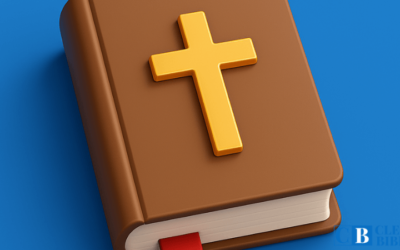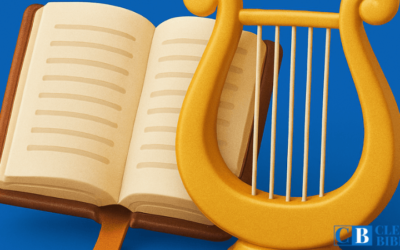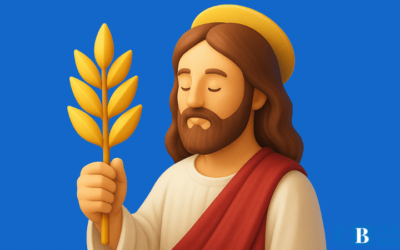Have you ever wondered what an ancient tale of sacrifice and faith can teach us about our lives today?
In the biblical narrative, the sacrifice of Isaac is one of the most striking and challenging episodes.
This story not only tests Abraham's faith, but also offers profound symbolism and lessons about obedience, faith, and redemption.
Join us as we explore the meaning behind this sacrifice, how the ram entangled in the thicket represents divine provision, and how this ancient event resonates with our modern understanding of faith and obedience.
We will explore the profound connection between the sacrifice of Isaac and the sacrifice of Jesus, and discover the lessons these biblical stories offer for our daily lives.
1. Historical and cultural context of sacrifice
To better understand the sacrifice of Isaac in Genesis 22:1-19, it is essential to understand the historical and cultural context in which this crucial event takes place.
Furthermore, understanding the relevance of the book of Genesis in the Bible gives us deeper insight into the importance of patriarchal stories.
Next, we will explore these aspects in detail:
The Age of the Patriarchs
The sacrifice of Isaac occurs at a time when the patriarchs play a central role in the biblical narrative.
Here I explain some key aspects of this era:
- Patriarchal societies:
In ancient times, societies were predominantly patriarchal, meaning that men, particularly fathers or family leaders, played a dominant role in decision-making and religious practices.
- Sacrificial practices in ancient times:
Sacrifices were an integral part of ancient religious practices, performed to honor the gods and secure their favor. These sacrifices could include animals and, in some cases, human beings. The practice of sacrifice was seen as a way to establish and maintain a relationship with the divine.
2. The book of Genesis and its importance in the Bible
Introduction to Genesis
The book of Genesis is the first book of the Bible and serves as an introduction to the central themes and characters of the biblical narrative.
Here I explain its importance:
- Foundation of the biblical narrative:
Genesis establishes the context of creation, original sin, and the beginning of the story of the patriarchs, including Abraham, Isaac, Jacob, and Joseph. These stories form the basis for understanding the events that will follow in later books.
- Establishment of theological themes:
Genesis introduces fundamental theological themes, such as faith, obedience, and divine promise, which are crucial to understanding the relationship between God and humanity.
Relevance of patriarchal narratives
The patriarchal stories in Genesis are essential to understanding the development of faith and the history of the people of Israel.
Here I explain its relevance:
- Models of faith and obedience:
The patriarchs, like Abraham, are presented as models of faith and obedience to God. Their willingness to follow divine instructions, even in difficult circumstances, serves as an example for future generations.
- Development of the divine promise:
Through the stories of the patriarchs, God's promise to bless his people and make them a great nation unfolds. These stories show how God fulfills his promises and establishes a covenant with his people.
The Life of Abraham
To understand the life of Abraham and his impact on the biblical story, it's crucial to examine his role as a man of faith and the covenant God established with him. Below, we'll explore these aspects in detail:
3. Abraham: a man of faith
Abraham is known for his unwavering faith in God and his obedience to His commandments.
Here I explain the most important aspects of his life:
Origins and the call of Abraham
- Origin and context:
Abraham, originally named Abram, was born in Ur of the Chaldees, an ancient city in Mesopotamia. His environment was a polytheistic society, but God called him to leave his homeland and follow a new path.
- God's call:
God made a special call to Abraham, asking him to leave his home and go to a land He would show him. This call involved an act of faith and obedience, as Abraham had to abandon everything he knew to trust in God's promise.
God's promise to Abraham
- Promise of a great nation:
God promised Abraham that he would be the father of a great nation, despite his advanced age and childlessness. This promise was the foundation of his faith and the basis for the fulfillment of God's plan.
- Blessing for all nations:
In addition to the promise of descendants, God promised that through Abraham, all the nations of the earth would be blessed. This refers to the future arrival of Jesus, who would be a descendant of Abraham and bring redemption to all humanity.
4. God's covenant with Abraham
The covenant between God and Abraham is a central element in the biblical narrative, marking a special relationship between them.
Here I explain the details of the pact:
The promise of offspring
- Confirmation of the pact:
God reaffirmed His covenant with Abraham, promising him descendants as numerous as the stars in the sky and the sand on the seashore. This promise became more concrete through the covenant God established with him.
- Test of faith:
Abraham's faith was put to the test when God asked him to sacrifice his son Isaac. This test demonstrated his obedience and trust in God, which was rewarded with the confirmation of the promise.
The symbol of the covenant: circumcision
- Establishment of the symbol:
God instituted circumcision as a symbol of the covenant between Himself and Abraham. This act became a distinctive sign of the special relationship between God and the people of Israel.
- Spiritual and cultural significance:
Circumcision was not only a cultural practice but also had profound spiritual significance. It represented separation from the unclean and commitment to God, marking Abraham's descendants as the chosen people.
With these detailed points, you can appreciate how Abraham's life and the covenant God established with him form the basis for understanding biblical history and promises that influence faith and spirituality. Ready to explore this topic further?
Isaac: The Son of Promise
To understand Isaac's importance in the biblical narrative, it is essential to explore his birth and his role in fulfilling God's promise. Below, we detail these aspects:
5. The Birth of Isaac
The birth of Isaac is a pivotal event in biblical history, marking the fulfillment of God's promise to Abraham and Sarah.
Here I explain the details of this event:
The announcement of Isaac's birth
- The visit of the angels:
God sent three angels to Abraham to announce the birth of his son, Isaac. This visit took place at Abraham's camp, where the angels informed him that Sarah, despite her advanced age, would give birth to a son.
- Sara's disbelief:
When Sarah heard the news, she laughed inwardly, for it seemed impossible to conceive in her old age. However, God reaffirmed that nothing is impossible for Him, emphasizing that the fulfillment of His promise would be an act of His power.
The joy of Sarah and Abraham
- Sara's joy:
Upon receiving the news of Isaac's birth, Sarah experienced profound joy. She expressed her laughter and wonder, saying that God had made her laugh and that all who heard of her miraculous pregnancy would laugh with her.
- The celebration of Abraham:
Abraham, like Sarah, was filled with joy at the fulfillment of the promise. The birth of Isaac was an occasion for celebration, as it represented God's faithfulness and the beginning of the fulfillment of His divine plan for Abraham and his descendants.
6. Isaac as the fulfillment of the promise
Isaac is not only the son of Abraham and Sarah, but he is also a central figure in the fulfillment of God's promises.
Here I explain its importance in the history of Israel:
The meaning of his name
- The name “Isaac”:
The name Isaac means "laughter" in Hebrew. This name was given as a reminder of the fact that both Sarah and Abraham laughed at the child's initial disbelief about the possibility of having a son in their old age.
- Symbolism of the name:
The name Isaac symbolizes joy and disbelief transformed into faith and hope. It is a reminder of God's ability to fulfill His promises even in seemingly impossible circumstances.
Isaac's role in the history of Israel
- Continuation of the promise:
Isaac becomes the heir to the promises made to Abraham. His birth ensures that God's promise will continue through him, and later, through his sons Jacob and Esau.
- Isaac's faith:
Isaac plays an important role in Israel's history as a man of faith. His life and actions, including the episode of the sacrifice on Mount Moriah, reflect obedience and trust in God, establishing a solid foundation for the future of the Israelite nation.
The call to sacrifice
To understand the profound meaning of the call to sacrifice Isaac, it's crucial to explore how God tested Abraham and the preparations they made for the journey. Below, I explain these aspects in detail:
7. God tests Abraham
The call to sacrifice Isaac is a significant test of Abraham's faith and obedience.
Here I explain the details of this event:
God's order to Abraham
- The divine commandment:
God commanded Abraham to take his son Isaac, the son of promise, and offer him as a sacrifice on a mountain He would point out to him. This instruction was an extreme test that challenged Abraham's faith and love for his son.
- The context of the test:
This command came after God had fulfilled His promise to give Abraham a son in his old age. The test was designed to assess whether Abraham was willing to obey God even when it meant giving up what was most precious to him.
Abraham's initial reaction
- Immediate obedience:
Despite the pain and difficulty of the command, Abraham responded with immediate obedience. He prepared Isaac and the necessary resources for the sacrifice, demonstrating his faith and submission to God's will.
- Uncertainty and faith:
Although Abraham likely experienced great inner anguish, his faith in God's promises kept him steadfast. He was convinced that God could raise Isaac from the dead if necessary, demonstrating his confidence in God's ability to fulfill His promises.
8. Preparations for the trip
Preparation for the sacrifice of Isaac involved a crucial journey to the place God had indicated.
Here I explain the details of the preparations:
The details of the trip
- Travel preparation:
Abraham got up early the next day, prepared a donkey, took two of his servants, and cut wood for the sacrifice. These preparations reflect his determination and commitment to God's command, despite the painful nature of the task.
- The Journey to Moriah:
Abraham and his group traveled for three days toward Mount Moriah, the place God had designated. This travel time increased the tension and anticipation, as Abraham had time to reflect on what he was about to do.
The importance of Moriah
- The significance of the place:
Mount Moriah is a place of great significance in biblical history. It is the site of the sacrifice of Isaac and, later, the location of Solomon's Temple in Jerusalem.
- The connection to Israel's history:
The choice of Moriah as the site of sacrifice underscores its significance in the history of redemption. Abraham's act at Moriah prefigures Christ's sacrifice at the same place, marking the beginning of a tradition of faith and obedience reflected in Jesus' final sacrifice.
The Journey to Moriah
To better understand the journey to Moriah and the conversation between Abraham and Isaac, it's essential to analyze the details of each. Below, I explain these aspects in detail:
9. The three-day journey
The three-day journey to Moriah is a crucial component in the narrative of Isaac's sacrifice.
Here I explain the details of this route:
The symbolism of the number three
- Biblical meaning of the number three:
In the Bible, the number three often symbolizes completeness or perfection. The three-day journey can be interpreted as a period of preparation and complete reflection for obedience to God.
- Prefiguration in Biblical History:
The three-day journey can be seen as a prefiguration of Jesus' resurrection on the third day. This parallel underscores the importance of obedience and faith in God's plan.
The relationship between Abraham and Isaac during the journey
- A journey full of reflection and faith:
During the three days, Abraham and Isaac had time to reflect on the mission. This period allowed Abraham to reflect deeply on his obedience to God, while Isaac remained uncertain about the ultimate purpose of the journey.
- The interaction between father and son:
The relationship between Abraham and Isaac is characterized by trust and love. Despite the difficult situation, Abraham acted with firmness and patience, demonstrating his faith and love for God and his son.
10. The dialogue between Abraham and Isaac
The dialogue between Abraham and Isaac is a significant moment that reveals Abraham's faith and Isaac's innocence.
Here I explain the details of this dialogue:
Isaac's question about the lamb
- Isaac's concern:
Isaac, seeing that there was no lamb for the sacrifice, questioned his father about the absence of the necessary animal. His question reflects his ignorance of the impending sacrifice and his trust in his father's plan.
- The symbolism of the question:
Isaac's question can be interpreted as an expression of his faith and obedience to his father. It also serves to highlight the great sacrifice Abraham was willing to make.
Abraham's response of faith
- God's promise:
Abraham responded to Isaac by saying that God would provide the lamb for the sacrifice. This response demonstrates his faith in divine provision and his trust that God would fulfill His promise.
- The lesson of faith and obedience:
Abraham's response not only demonstrates his faith in God, but also his ability to guide Isaac through this trial without revealing the whole truth. This act of faith becomes a lesson for everyone about trusting God's plans and promises.
The sacrifice on Mount Moriah

To understand the sacrifice on Mount Moriah and its crucial aspects, it is important to examine in detail both the construction of the altar and the crucial moment of the sacrifice. Below, I explain these aspects in detail:
11. The construction of the altar
The construction of the altar is a symbolic and practical act that marks the preparation for the sacrifice of Isaac.
Here I explain the details of the construction of the altar:
Description of the altar
- Construction with stones:
Abraham gathered stones to build the altar.
The stones were carefully stacked to form a solid structure on which the sacrifice would be performed.
- Functional and symbolic aspect:
The altar not only served as the physical place for sacrifice, but also symbolized dedication and obedience to God.
The construction of the altar represented the act of establishing a sacred place to offer the most valuable things to God.
Preparations for sacrifice
- Preparing the log and arranging it:
Abraham placed the wood on the altar.
Firewood was essential for the fire that would consume the sacrifice, and its arrangement on the altar was a crucial aspect of preparation.
- Binding of Isaac:
Abraham bound Isaac and placed him on the altar.
This action underscores the seriousness of the trial and Abraham's willingness to comply with God's command, despite personal pain.
12. The crucial moment
The crucial moment is the climactic sacrifice on Mount Moriah, where Abraham's obedience and faith are put to the ultimate test.
Here I explain the details of this crucial moment:
Abraham's disposition
- Obedient and determined attitude:
Abraham showed a total willingness to obey God, even in the midst of difficulty.
His determination and faith in divine provision led him to act without hesitation, even when faced with the prospect of sacrificing his son.
- The imminent sacrifice:
Abraham raised the knife to sacrifice Isaac.
This act demonstrates the depth of his faith and his willingness to do what he believed to be God's will, not allowing fear or pain to stop him.
The intervention of the angel of the Lord
- The divine arrest:
At the critical moment, an angel of the Lord intervened to stop Abraham.
This divine intervention demonstrates God's mercy and confirms that Abraham's faith and obedience had been sufficient.
- Provision of a substitute:
The angel of the Lord informed Abraham that God had provided a ram for the sacrifice instead of Isaac.
This not only shows God's provision, but also the validation of Abraham's faith and obedience.
The replacement of sacrifice
To understand the replacement sacrifice on Mount Moriah, it's essential to explore both the discovery of the ram and the act of sacrifice and the meaning of replacement. Below, I explain these aspects in detail:
13. The ram entangled in the bramble
The ram entangled in the bramble represents the divine substitute for the sacrifice of Isaac.
Here I explain the details of the ram tangled in the bramble:
The discovery of the ram
- Discovery of the animal:
After Abraham lifted the knife, the angel of the Lord showed him a ram caught in a thicket.
This discovery occurred at the exact moment Abraham was about to sacrifice Isaac, underscoring divine providence in the situation.
- The relevance of the place:
The ram was entangled in a bramble bush, symbolizing divine provision in the time of greatest need.
This scenario reflects how God provides an alternative when obedience is complete and faith is firm.
The meaning of replacement
- The act of redemption:
The ram in place of Isaac represents the idea of substitution and redemption.
In biblical theology, this prefigures the sacrifice of Christ as the Lamb of God who takes away the sin of the world, offering an image of substitution and salvation.
- Fulfillment of the divine mandate:
The provision of the ram fulfilled the divine mandate of sacrifice without requiring the sacrifice of the son.
This act reaffirms God's mercy and faithfulness to those who obey Him, showing that He does not demand unjust sacrifices.
14. The sacrifice of the ram
The sacrifice of the ram is the culmination of Abraham's trial and the fulfillment of God's command.
Here I explain the sacrifice of the ram:
The act of sacrifice
- Preparation of the mutton:
Abraham took the ram and offered it as a burnt offering instead of his son Isaac.
This act of sacrifice followed the same procedure that would have been followed with Isaac, demonstrating Abraham's complete obedience and acceptance of divine provision.
- The sacrifice on the altar:
The ram was sacrificed on the altar that Abraham had previously built.
This completes Abraham's act of obedience and devotion, ensuring that the sacrifice will be performed according to divine instructions.
The satisfaction of the divine mandate
- Fulfillment of God's will:
By sacrificing the ram instead of Isaac, Abraham demonstrated his complete faithfulness and obedience to God.
This fulfillment of the divine command not only satisfied the requirement of sacrifice, but also validated Abraham's faith and dedication.
- Confirmation of divine provision:
The fulfillment of the command through the sacrifice of the ram reaffirms God's provision for those who obey him.
This provision not only fulfills the command, but also highlights God's generosity and care toward his followers.
God's blessings
To understand God's blessings that flow from Abraham's obedience, it's essential to explore how God's promise is reaffirmed and its impact on Abraham's descendants. Below, I explain these aspects in detail:
15. The reaffirmation of the promise
God reaffirms his promises to Abraham after his act of obedience in the sacrifice of the ram.
Here I explain how the promise is reaffirmed:
The voice of the angel of the Lord
- The divine declaration:
The voice of the angel of the Lord calls to Abraham from heaven, reaffirming the promise made earlier.
This act of divine intervention confirms that Abraham's obedience has been well received and that God's promises will remain true.
- Confirmation of fidelity:
The angel declares that because Abraham has not spared his son, God will bless him.
This statement underlines that complete obedience to God brings with it the confirmation of his promises and blessings.
The repeated blessings to Abraham
- Promise of prosperity:
God promises Abraham that he will be blessed and that his descendants will be as numerous as the stars in the sky and the sand on the seashore.
This promise of prosperity and multiplication reinforces the certainty of divine blessing in Abraham's life.
- Reaffirmation of the alliance:
The reaffirmation of the promise also includes a renewed guarantee of the covenant made with Abraham.
This demonstrates that the special relationship between God and Abraham is strong and that the promised blessings will be manifested in his life and in the lives of his descendants.
16. The impact on Abraham's descendants
God's blessings have a lasting impact on Abraham's descendants, extending beyond his lifetime.
Here I explain the impact on offspring:
The promise of multiplication
- Number of offspring:
God promises that Abraham's descendants will be innumerable, like the stars in the sky and the sand on the seashore.
This promise lays the foundation for the nation of Israel and its central role in biblical history.
- Strength and prosperity:
The multiplication of offspring also implies the strength and prosperity of the nation.
Abraham's descendants, like the people of Israel, would experience significant growth and success due to divine blessings.
The blessing to all nations
- The universal promise:
God declares that all nations of the earth will be blessed through Abraham's descendants.
This promise anticipates the redemptive role of Jesus Christ, who, as a descendant of Abraham, will be a blessing to all humanity.
- Fulfillment in Christ:
The blessing of all nations is fulfilled through the ministry and sacrifice of Jesus Christ, who is the final fulfillment of the promise made to Abraham.
This universal blessing underscores the global impact of Abraham's obedience and the extension of God's grace to all people.
Lessons and teachings
To understand the lessons and teachings derived from the sacrifice of Isaac, it is essential to explore Abraham's unwavering faith and the symbolism of sacrifice in the biblical narrative. Below, I explain these aspects in detail:
17. Abraham's unwavering faith
The story of Abraham highlights a faith that did not waver despite the most difficult trials.
Here I explain how this faith manifests itself:
Examples of faith in the Bible
- Obedience to the divine call:
Abraham demonstrated unwavering faith by responding to God's call to leave his homeland and follow an uncertain path.
This initial act of obedience shows Abraham's willingness to trust God's promises, despite the lack of tangible certainty.
- The proof of Isaac's sacrifice:
Abraham shows his faith by being willing to sacrifice his son Isaac in obedience to divine command.
This event is an extreme example of faith, where Abraham trusts that God will fulfill his promise that through Isaac, God will establish a great nation.
Application of faith in daily life
- Trust in God's promises:
Abraham's faith teaches us to trust in God's promises, even when we face uncertain or challenging situations.
Applying this faith in our daily lives means maintaining hope and trust in God's promises, even when we don't see immediate results.
- Obedience to the divine will:
Unwavering faith is also manifested in obedience to God's will, even when His instructions seem difficult or incomprehensible.
Following Abraham's example means being willing to obey God and follow his ways, knowing that his plans are always for our good.
18. The symbolism of the sacrifice of Isaac
The sacrifice of Isaac has profound symbolism in biblical history, foreshadowing future events and theological teachings.
Here I explain the symbolic aspects:
Prefiguration of Christ's sacrifice
- The surrender of the only son:
The sacrifice of Isaac prefigures the sacrifice of Christ, the only Son of God, who was also offered as a sacrifice.
In both stories, the willingness to give up the son reflects a profound obedience and love, which ultimately manifest themselves in redemption and salvation for humanity.
- Divine provision:
Just as God provided a ram to replace Isaac, God provided Christ as the perfect sacrifice for humanity.
This parallel highlights how God always provides a solution for redemption and forgiveness, reflecting His love and mercy.
Theological interpretations
- The concept of substitution:
The story of Isaac introduces the concept of substitution, where the sacrifice of an animal replaces the sacrifice of Isaac.
This idea is developed in Christian theology with the sacrifice of Christ as the perfect substitute for sin, leading to reconciliation between God and humanity.
- The test of faith and obedience:
The sacrifice of Isaac is also interpreted as a test of Abraham's faith and obedience, serving as a model for Christian life.
This test underscores the importance of faith and obedience in one's relationship with God, and how these qualities are fundamental to the life of a believer.
Frequently Asked Questions about the Sacrifice of Isaac according to Genesis 22:1-19
Why did God ask for a human sacrifice?
God demanded the sacrifice of Isaac to test Abraham's faith and obedience. The purpose wasn't really for Isaac to be sacrificed, but rather to demonstrate Abraham's willingness to trust God even in the most difficult circumstances.
What does the ram entangled in the bramble represent?
The ram entangled in the thicket represents the substitute sacrifice God provided in place of Isaac. This symbolizes divine provision and prefigures Christ's sacrifice as a substitute for humanity in Christian tradition.
How does this story affect our understanding of faith?
The story of Abraham and Isaac illustrates that true faith involves total obedience and trust in God, even when instructions seem difficult or incomprehensible. It teaches us that faith is tested in times of difficulty and trust in God's promises.
What can we learn about Abraham's obedience?
Abraham's obedience shows that genuine faith involves following God's instructions without question. His willingness to sacrifice Isaac reveals absolute trust in God's plan and a willingness to submit his own will to God's.
What was the sacrifice of Isaac?
Isaac wasn't actually sacrificed. The sacrifice of Isaac is a test of faith in that God stopped the sacrifice at the last moment and provided a ram to be sacrificed in Isaac's place.
What does the sacrifice of Isaac teach us?
The sacrifice of Isaac teaches us the importance of obedience to God and unwavering faith. It also symbolizes the idea that God will provide a substitute sacrifice and that true faith is demonstrated in obedience to divine instructions.
Why does God command Abraham to sacrifice Isaac?
God commands Abraham to sacrifice Isaac as a test of faith and obedience. The purpose was to demonstrate Abraham's total commitment to God, not so that Isaac would actually be sacrificed, but to evaluate Abraham's faithfulness.
When does God ask for Isaac as a sacrifice?
God asks Abraham to sacrifice Isaac in Genesis 22, after Abraham had already established a relationship of faith and trust with God throughout his life.
How old was Isaac when he was to be sacrificed?
The Bible does not specify Isaac's exact age, but it is estimated that he was between 15 and 30 years old at the time of the event, based on the historical context and the development of the biblical narrative.
What is the relationship between the sacrifice of Isaac and the sacrifice of Jesus?
The sacrifice of Isaac is seen as a prefiguration of Jesus' sacrifice. Both accounts involve the sacrifice of the only son and the divine provision of a substitute, symbolizing redemption and Christ's ultimate sacrifice for humanity.
What purpose did God have for Isaac?
God intended to fulfill His promise that Abraham would be the father of a great nation through Isaac. Isaac was central to the fulfillment of the divine covenant and the plan of redemption that would unfold through his descendants.
What can we learn from Isaac in the Bible?
From Isaac, we can learn about the importance of obedience and faith in God, as well as the value of being part of a larger divine plan, despite personal challenges.
What did God promise Isaac?
God promised Isaac that he would be blessed and that his descendants would inherit the land promised to Abraham, establishing a great nation and continuing the divine covenant.
What lessons can we learn from the story of Abraham?
The story of Abraham teaches us about the importance of faith, obedience, and trust in God. It shows how true faith is tested in difficult circumstances and how God rewards obedience with blessings.
What message does the sacrifice of Isaac leave us?
The sacrifice of Isaac leaves us with the message that faith implies complete obedience to God, even when trials are extreme. It also teaches us about divine provision and the value of trusting in God's promises.
What happened to the sacrifice of Isaac?
Isaac was not sacrificed. At the last moment, God stopped Abraham and provided a ram for the sacrifice instead of Isaac, thus demonstrating his provision and faithfulness.
What was Abraham's test of faith?
Abraham's test of faith was his willingness to sacrifice his son Isaac in obedience to God's command. This test demonstrated his complete trust in God and his willingness to follow His will without reservation.
How many wives did Isaac have in the Bible?
Isaac had two wives in the Bible: Rebekah, his primary wife and the mother of his sons Esau and Jacob, and later Keturah, with whom he had six additional sons.
What is the meaning of the name Isaac?
The name Isaac means "laughter" or "will laugh" in Hebrew. This name was given because Sarah laughed upon hearing the promise that she would have a son in her old age.
What happens to Isaac at 40?
At age 40, Isaac married Rebekah, who was chosen as his wife by his father Abraham, fulfilling the divine mandate and establishing the continuation of Abraham's line.
What did God do to stop Isaac from being sacrificed?
God stopped Isaac's sacrifice by sending an angel to stop Abraham at the crucial moment. Furthermore, God provided a ram caught in a thicket to be sacrificed in Isaac's place.
What was God's purpose for Isaac's life?
God's purpose for Isaac was to continue the covenant established with Abraham and to be the patriarch of a great nation. Isaac was fundamental to the fulfillment of God's promises and the development of the people of Israel.
What did God see in Isaac?
God saw in Isaac a man of faith and obedience who would continue the divine covenant with Abraham. Isaac was a vehicle through which God's promises would be fulfilled and the promised nation would develop.
What did Isaac do to please God?
Isaac pleased God by living a life of faith and obedience, following the example of his father Abraham. His devotion and fulfillment of God's promises were central to God's plan.
What was the most important thing Isaac did?
The most important thing Isaac did was to be the heir of God's promise to Abraham. His life and descendants continued God's plan to establish a great nation.
What values does Isaac teach us?
Isaac teaches us the values of faith, obedience, and faithfulness to God's promises. His life demonstrates the importance of trusting in God's plan and following the teachings of our ancestors.
What was Isaac's sin in the Bible?
Isaac is not widely singled out for serious sins in the Bible. However, some studies suggest that he may have erred in choosing to bless Esau instead of Jacob, which was an act of disobedience to God's revealed will.
How old was Isaac when he was to be sacrificed?
The Bible does not specify Isaac's exact age when he was about to be sacrificed, but it is estimated that he was between 15 and 30 years old, based on the historical context and the development of the narrative.
Conclusion
In short, the sacrifice of Isaac is much more than a test of faith; it is a timeless lesson about obedience, sacrifice, and divine provision.
By exploring this story, we better understand how God uses trials and challenges to strengthen our faith and guide us toward a greater purpose.
The connection between the sacrifice of Isaac and the sacrifice of Jesus underscores a message of redemption and hope that resonates throughout the scriptures.
Now we invite you to reflect on the impact this story has on your life.
How have the lessons of Isaac's sacrifice influenced you in your own faith journey?
Share your thoughts and experiences in the comments below.
We'd love to hear how this powerful biblical story has touched your life and what lessons you've learned from it!
Discover How the Bible Can Transform Your Life
- Bible Study – explore the teachings of the Bible and find answers to life’s challenges.
- Fundamental Beliefs – delves into the principles that have guided millions through the centuries.
- Spiritual Growth – Strengthen your faith with studies designed to bring you closer to God.

Discover How the Bible Can Transform Your Life
- Bible Study – explore the teachings of the Bible and find answers to life’s challenges.
- Fundamental Beliefs – delves into the principles that have guided millions through the centuries.
- Spiritual Growth – Strengthen your faith with studies designed to bring you closer to God.



























0 Comments